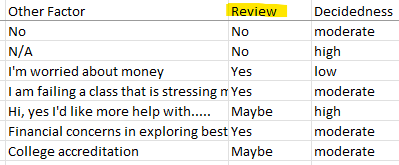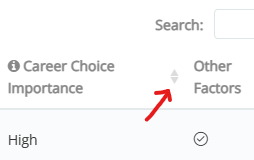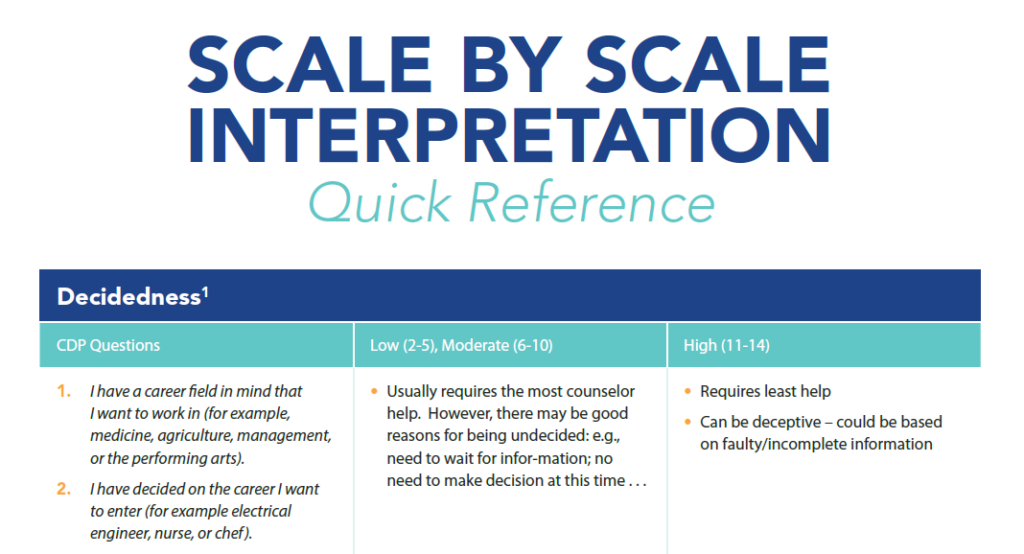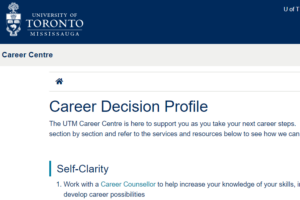Table of Contents
Want to know how CDP scales relate to one another? It’s in the Scale by Scale Quick Reference and the CDP Manual.
Time to Complete
8 minutes
Overview
Career Decision Profile (CDP) results help you explore clients’ career decision status including indecision. Scale by scale, we show you what scores mean and what you might consider as you advise them. Our CDP Scale by Scale Interpretation Quick Reference will help.
Wherever they are on their career decision journey, you will help them make progress in the right direction using the CDP and advisor tools found in Career Key Central. To read the tips clients’ receive for understanding their results, see the CDP self-interpretation tool.
Takeaways
- How to interpret each scale
- Learn the score levels to better advise clients
- Learn about Other Factors and their importance
- Guidance on content for your organization CDP page
- How to use CK Central tools to follow up
Decidedness and Comfort
Decidedness and Comfort scales often have a positive relationship to one another. In general, the more decided someone is, the more comfortable they are with where they are in making a decision – and vice versa.
But this relationship does not always hold. In one study, 28% of the participants did not fit this pattern. It is important not to make assumptions about a person’s comfort with how decided they are.
Low scores on the Decidedness and Comfort scales will raise questions about the nature of that person’s indecision and how you can help. Below we give you information about each scale that should help you explore results with the person.
Decidedness
“Have you decided on a career? How certain are you? Think about it for a moment… Now choose the appropriate number (1-7) below to show how much you agree with the following statements:
1. I have a career field in mind that I want to work in (for example, medicine, agriculture, management, or the performing arts).
2. I have decided on the career I want to enter (for example, electrical engineer, nurse, or chef).
Low scores (2-5), Moderate scores (6-10)
Most advisors will work with people scoring low to moderate on this scale, focused on helping them decide. But keep in mind that there may be good reasons to be undecided. A person might,
- Lack clarity about their personality and interests
- Lack information or knowledge about their options
- Not be developmentally ready
High scores (11-14)
At the same time, be cautious about interpreting a person’s high scores and dismissing their need for your help. We have all encountered highly decided people who haven’t fully researched or reality-tested their choice. Researchers label this a “pseudocrystallized choice,” one likely to dissolve when implemented.
Comfort
“Now that you have indicated how decided you are, how do you feel about where you are in the process of making a choice?
3. I feel at ease and comfortable with where I am in making a career decision.
4. I’m not worried about my career choice.”
Low scores (2-5), Moderate scores (6-10)
This scale suggests the level of motivation the person has for advising and career counseling. Individuals with low scores may be more likely to ask for help from professionals.
But sometimes the opposite occurs. If a discoverer is prone to anxiety, they may be fearful about advising or counseling. Anxiety may occur when someone considers stressful situations to be dangerous or threatening. You may, as you learn more about the person, decide to refer them for professional counseling.
High scores (11-14)
As we discussed with high scores in decidedness, high comfort levels don’t mean a person doesn’t need advice. Encourage people to re-examine the information, alternatives, and consequences of their choice to ensure they are making a good decision.
Career Decision Needs
For you, this section and the next (Barriers) are likely to be the most important in helping people.
While these scales help are helpful, you want to keep in mind that there may be needs that clients are unaware of or unwilling to share. The Barrier scale, in the next section, may help bring those to the surface.
The CDP starts with these instructions:
“Now you will read statements people make when talking about making a career choice. Please read each statement and choose the number that shows the extent to which you agree or disagree that it describes you.”
In interpreting these four scales, we divide scores into Low (3-5), Moderate (6-15), High (16-21).
Self-Clarity
5. I wish I knew which careers best fit my personality.
6. I need to have a clearer idea of what my interests are.
7. I need to have a clearer idea of my abilities, my major strengths and weaknesses.
For low to moderate scores
We recommend self-exploration activities and resources your organization offers. Refer to them on your custom CDP page. On the client’s CDP results, we suggest:
- Take online assessments to explore personality, interests, and values
- Identify your strengths and motivated skills – ones you enjoy using most
- Talk with an advisor for expert help, and to grow your support system
For high scores
In the CDP results, we suggest:
- Reality test your assumptions through experiential learning and “real world” work and volunteer experiences
- Search for negative information about your choice and reflect on how to handle it
- Talk with an advisor for expert help and to grow your support system
Knowledge of Careers and Education Programs
8. I need information about educational programs (for example: majors, training) I want to enter.
9. I don’t feel I know enough about the careers that I am considering.
10. I know what my interests and abilities are, but I am unsure how to find careers that match them.
For low to moderate scores
The CDP recommends career and education resources your organization offers. (Refer to them on your custom CDP page). In CDP results, we suggest:
- Talk to people working in a career or studying in an education program
- Take a career exploration course
- Sign up for informational interviews, job shadows, and experiential learning
- Creatively consider a wide range of options, including different educational paths to reach your career goals
For high scores
Recommend activities include,
- Creatively consider a wide range of options, including different education paths to reach career goals
- Make plans to implement your decision. Consider how you might pivot to a Plan B due to circumstances outside your control (for example, change in economic circumstances, rejection by a graduate program or employer)
Decisiveness
11. I feel relieved if someone else makes a decision for me.
12. I am an indecisive person; I delay deciding and have difficulty making up my mind.
13. I frequently have difficulty making decisions.
For low scores
We recommend you consider referring these clients to a professional counselor. Helping an indecisive person can be complex and may involve mental health concerns such as depression and anxiety. If possible, refer the person to a trained counselor or mental health professional for advice.
In Career Key Central, we always estimate a service level of Individualized, Case Managed for these clients regardless of how they score on other scales.
In CDP Results, we recommend:
- You indicated you have difficulty making decisions without unnecessary delay, difficulty, or reliance on others. There are many possible reasons for this; it’s best to consult a professional counselor if this causes you difficulty.
Career Choice Importance
14. I don’t need to make a career choice at this time.
15. My future work or career is not that important to me right now.
16. I don’t have strong interests in any career field.
Low scores
While these individuals often fall into the Self-help service level, we know some people avoid uncomfortable situations or self-reflection. In CDP Results section, we suggest:
- Even though making a career decision is not important to you right now, there are still actions you can take to make that decision easier later. It’s less stressful to gather information and self-reflect when you have more time than when you’re up against a hard deadline.
Moderate to high scores
These individuals may be more motivated to seek out and accept your help. CK Central often estimates a higher service level because of their perceived need for help. In CDP Results, we suggest:
- Remember to be gentle with yourself – you may be learning a new life skill — how to make important decisions.
- We make a series of career decisions over the course of our lives, based on the best information we can gather at the time. Most people have multiple careers on their journey. Success is about progress, not reaching perfection.
- You’ve made progress already by reflecting on your career decision status! Keep moving forward by taking action.
Barrier(s) – Capacity for Progress
These items may reveal some of the most influential information about the client. For that reason, we score the Barrier scale higher than other CDP scales.
For this scale, we divide scores into Low (4-11), Moderate (12-19), High (20-28).
Barrier(s)
“There is an important problem that I face – related to my finances, health, past life, relationship with others, or something else – that,
17. Worries me. It is hard to make a decision with this problem going on.
18. Is a barrier for me. It keeps me from choosing what would make me happiest.
If you want, share your problem with us in the next, last question. We may be able to help.”
For low scores
We recommend you offer support and help tailored to their problem. In Career Key Central, we always estimate a service level of Individualized, Case-Managed for these clients.
A barrier like this could involve,
- Fear of disappointing parents or loved ones
- Lack of funds to pursue required education or training
- Being too far along in a college major to change
- Family obligations
- Significant health problems
We hope the person will share that problem with you in “Other Factors,” the CDP’s final question. If not, you will likely want to contact the person. Your organization may have resources tailored to problems like theirs that you can offer.
In CDP results, we suggest:
- You indicated you face an important problem that significantly impacts your decision making. It’s best to talk with an advisor or counselor who can help you resolve or reduce this problem’s impact on you.
Other Factors
“Please share any other factors that are important in understanding your situation.”
We recommend you place close attention to what clients share in this section. Remember that frequently there are factors they may not be aware of or unwilling to share. Anything a client shares can start a meaningful conversation and help you provide the support they need.
Other Factors Notifications
You will learn two things: (1) clients who shared substantive Other Factors, and (2) our 3-level ranking system to help you prioritize their support using a proprietary algorithm.
For now, only account managers and customer-designated individuals receive weekly email notifications of clients who share substantive Other Factors, which is an experimental, AI-enabled beta feature.
When and what we will share
Every Tuesday at 9:00 am EST, if any clients have shared substantive text in the Other Factors box since the last report, we will send you an email from [email protected] with the subject line: Important: This week’s Other Factors review.
It will contain a download link for a password-protected Excel file containing a new REVIEW column and a list of clients with substantive Other Factors. If no clients have shared anything new, you will not receive an email.
Substantive Other Factors means everything except for words like N/A, nothing, or the irrelevant such as ‘I love cats.’”
In the REVIEW column, for each client, we categorize them “yes, no, and maybe.” We use the term review because the Account Manager is in the best position to be the final reviewer and judge of how best to prioritize the client information.

Yes: we recommend review, highest priority
Maybe: we recommend review, moderate priority
No: we do not recommend review, lowest priority
We will revisit categorization accuracy with you later at the next Roundtable or customer meeting. If we miscategorized something, we want to know so we can update our model. Someday, we hope to eliminate the “maybe” category.
Export Other Factor review reports anytime
The notification download link expires after 72 hours, but you can get one any time in Career Key Central. Just follow these steps:
- Set date range,
- Click on the Other Factors indicator sort arrow on your CDP Clients table. (To see it, you may need to scroll across using the scrollbar at the bottom.) That way you see all the clients who shared other factors. Select and export as desired.

NOTE: any administrative user, including group counselors can export and download an Other Factors review report, or see an individual’s Other Factors.
Feedback and improvements
For now, Career Key previews these reports for accuracy before sending them. We will seek your feedback during the next June Higher Ed Roundtable. But don’t wait to share feedback with us. The main goal is to increase effectiveness and efficiency in these notifications.
Your Custom CDP Resources Page
While Career Key recommends actions and resources to clients based on our experience, they likely will find your resources particularly helpful.
At the end of each discoverer’s CDP results, Career Key recommends “[v]isit your organization’s Career Decision Profile (CDP) page for exclusive resources” and includes one web page URL to your website.
We also include that URL in the email we automatically send discoverers upon completing the CDP.
Creating this page when you implement the CDP at your organization greatly enhances its usefulness to clients. See an example at the University of Toronto – Mississauga Career Centre.
After you create the page, here’s how to add it to your web application for clients to start seeing it right away.
- In CK Central, go to Settings Gear (top right)> My Organization> Technical Tab.
- Choose the plug in you are using and click on the “Configure Plug In” button.
- Paste the custom URL in the “Resource URL” box.
- Click Save.
Organize by Discoverer Need
If your organization is a postsecondary institution, your career services department will be a critical partner in helping you create your CDP resources page.
Self-Clarity
- Interest inventories and self-assessments, such as Career Key Discovery (if using)
- Strengths-based assessments like StrengthsFinder
- Motivated skills exercises
Knowledge about Careers and Education Programs
- Your organization’s majors
- Occupational Outlook Handbook; drill down by state/region
- Localized resource for labor market information
Decisiveness
- 4 step decision making process, Career Key website
- Professional counseling resources your organization offers
Overcoming Barriers
Your organization may notice its clients encounter the same barriers and recommend local resources for them. Other visitors to this page may see barriers they did not share themselves but apply to them, expanding the page’s helpfulness.
Helpful Career Key Central Tools
Career Key Central (CK Central) will help you get the most out of the CDP. It helps organizations manage their use of the CDP, our career interest inventory Career Key Discovery, or both.
Find a client’s results
Search for and read an individual client’s results via the main dashboard page, Career Decision Profile Clients.
Learn more in Support > Manage CDP Clients.
Contact with clients using Let’s Connect
Follow up with one or more clients by sending a custom or Career Key-created template email message. We created a different template (that you can modify) for each of the 3 service levels: Self-help, Brief Staff Assist, and Individual, Case Managed.
Learn more in Manage CDP Clients> Engage with Clients.
Create and manage groups
Create groups of clients and if you want, assign them to counselors. Once you have groups, you can filter and limit your view to those discoverers in your main list. For example, you may want to organize discoverers by cohort, like graduation year or program participants
Learn more in Manage CDP Clients> Create and Manage Groups.
Export clients’ data into .csv
Export and download results data for a selection or all of your clients in a .csv file. You can do further analysis or upload into a different system.
Learn more in Manage CDP Clients> Export Clients’ Data.
Set up CDP use by Department or Program
Career Key can help you configure and customize CK Central so that each department has its own dashboard, set of advisors, and Custom CDP Web Page for clients.
Next Step:
About Career Decision Profile > Screen for Career Readiness
Related:
About Career Decision Profile > CDP Manual
Support > Manage CDP Clients

